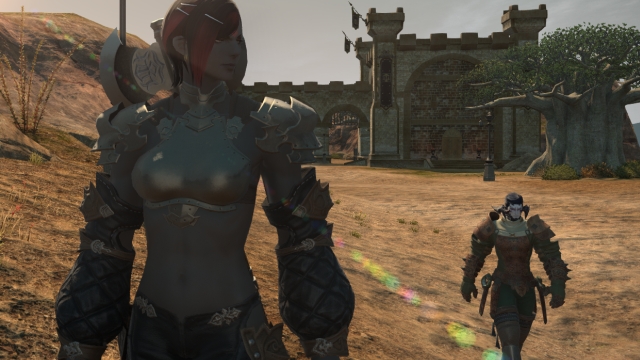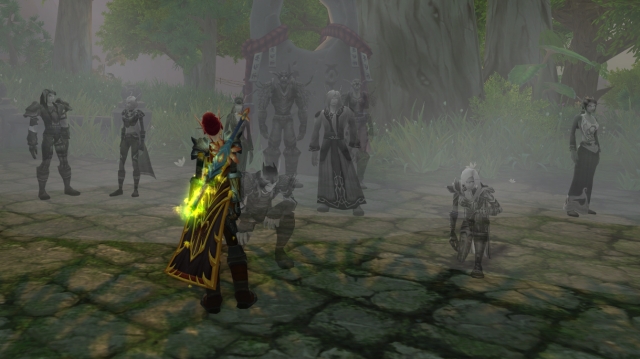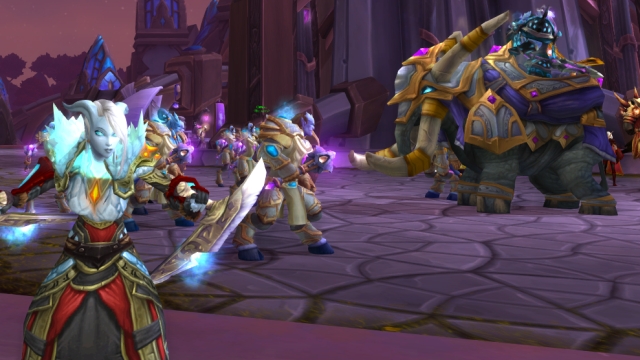As an officer, your job really comes down to managing situations wherein someone walks away unhappy. That’s inevitable. Half of the guild wants to focus more heavily on raiding, half of the guild wants to focus more on small-group activities. As an officer, you hear both sides, you make a decision, and the issue is resolved painlessly. Hooray!
And now half of the guild is angry. Less hooray! Anti-hooray! (What’s the opposite of hooray?)
It’s obvious when you think about it, but as an officer you are never going to make everyone happy. Any time you have people with differing opinion, someone’s going to get what they want… and someone is not. And thus, you have to manage the fact that some people in the guild are going to be unhappy with the end result.
There’s no easy way to deal with this and pretty much no way to prevent it, but you can at least work to minimize the effects. So let’s talk about how you can deal with disgruntled members before they’re former members.

Avoid disgruntling people in the first place
One of the first tools in an officer’s toolbox is making sure that someone doesn’t ever become disgruntled, which seems kind of obvious but also has some long-term impacts. The trick is trying to thread a middle path without looking at any of your options as either-or propositions, which is especially difficult when you consider that most of the members of your guild will look at things that way.
Let’s look at that example from the introduction again. Yes, your guild cannot be focused on both raiding and not-raiding at the same time; either you’re splitting your focus or you aren’t really supporting either. But you can put in the effort to find out why the groups involved feel pulled in two different directions. It’s possible (albeit not necessarily likely) that you can mitigate the issue with some minor changes, thus ensuring that the group which doesn’t get their way still feels like they’re being heard and mollified.
This isn’t always the case, of course. Sometimes the issue is going to be as simple as the raiding group wanting everything to center around raiding and the non-raiding group wanting the inverse. Someone’s going to wind up unhappy there no matter what you do. But you should at least try to find out what’s actually mutually exclusive before assuming that it’s everything. Sometimes you’ll find that it’s less than you thought.
It’s also important to know how intense support for each side is. It’s possible that one side really wants more focus on raiding, but the non-raiding group is generally not very passionate about opposing it. In that case, the non-raiding group won’t be very disgruntled if they don’t get their way… but the raiding group is likely to be spitting fire.
Usually, there are passionate people on both sides, but the real question remains which side has more passionate people and which side has more people whose support comes with a shrug. Those people are unlikely to be upset if things don’t go their way. Realize that when making tricky calls, and you can at least minimize the fallout if not avoid it altogether.

Throw immediate bones to the losers.
Let’s say that your had an issue where some of your guild wanted to have a regular group dungeon run schedule while the majority favored having a loose system. The majority won, and there’s no regular schedule. Now, your first step should be to start scheduling some runs yourself.
“But why? That side lost.” Yes, but the important thing is to realize that they wanted this for a reason. You may not be offering regular scheduled stuff that this group wanted, but you can show them that you understand their position and still want to support them by taking a smaller action.
Maybe that group of players gets nervous around strangers, maybe that group only can play for limited times during the week and needs to get things done promptly, maybe it’s just easier for them to mark off specific times for dungeon runs and forget about them otherwise. It doesn’t actually matter; what matters is that even though they lost the battle, they still feel like their concerns and needs were heard and are being addressed by the officers.
It’s important to also make it clear, though, that you’re doing this as an olive branch rather than capitulating after the fact. You’re happy to schedule a few runs and run them with these folks, but they’re also going to need to step up if they want to do this on a regular basis. If they don’t… well, it won’t happen. You’re making it clear that you care, but you’re not reversing the decision. You just want to meet people halfway.

Talk with the losing side
You might be surprised how many situations can be forestalled just by sitting down with the people who disagree with your decision and explaining why you made the decision. Maybe not 100%, but easily 80%.
The fact of the matter is that most of the people who are in your guild are likely there because they want to be there. So when a conflict comes up, both sides find themselves in an odd position. They both want to continue being in the guild, but they also both feel that they need something the guild isn’t providing. Dissatisfaction comes from when they still need X but aren’t getting it, even after making it clear that they need X.
Talking with them, then, is crucial. It helps to convey the message that you know they need X, but the other side needs Y and Z, and you can’t provide all of them. It gives you the opportunity to make it clear that you aren’t happy either, that your preferred sequence of events involves everyone getting what they need instead of this being a conflict. You can’t accomplish that, unfortunately, so you have to go with a compromise.
Not everyone will care, of course, but you’d be surprised how many people will be more amenable to things when they realize that the alternative is doing more long-term damage to the guild as a whole. Oh, sure, they’ll still want the same things (you can hardly blame them for it), but they also want to be here in the first place and thus don’t want to damage what already exists. Realizing that what they need hurts the group that they love is the sort of thing that can soften opinions.
Obviously, you will never be able to entirely eliminate hurt feelings. When people want something and they don’t get it, they’re going to be upset. But you can take steps to make sure that the disgruntled members of your guild grumble a bit and then move on instead of becoming a festering sickness, which is probably the best outcome in the long term. No one likes festering sicknesses, after all; they’re unhealthy.







Published: Feb 10, 2017 09:56 am